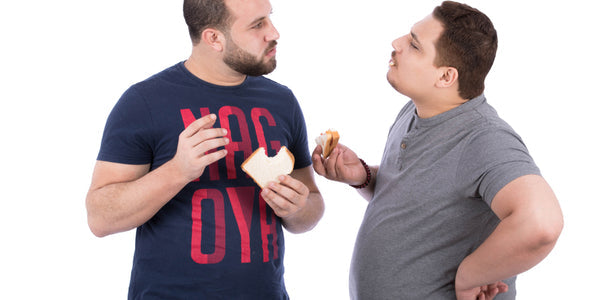
Have you ever been out shopping with a friend and declared that a pair of jeans make you look absolutely disgusting, when in reality, they really didn’t? And to that claim your friend replies, “These jeans are too short! I need to be either taller or skinnier!”
Have you ever made a statement about your body that you didn’t agree with, but you went ahead and made it anyway because you felt like you were supposed to? If you have, and according to a University of Notre Dame study, 93% of women have, then you’ve just participated in fat talk.
What is “fat talk”?
Fat talk is the body-denigrating conversation between girls and women (and sometimes men). It’s a “bonding” ritual that psychological researchers describe as “contagious,” aggravating poor body image and even setting the stage for eating disorders.
In one study, 124 male and female college students were shown a scene describing three women who were engaging in fat talk. The test subjects were asked to predict how a fourth female would respond to this discussion.
40% of male subjects and 51% of female subjects believed that the fourth female would self-degrade her body.
Fat talk occurs because women feel pressured to follow the fat talk norm so they are more likely to engage in fat talk with other females. Therefore, in order to feel accepted, women feel like they have to degrade their own bodies in order to fit in.
Another study showed that women are more likely to accept an overweight female who speaks positively about her body than a skinny female who doesn’t.
In yet another revealing study, 139 undergraduate students were shown photos of two thin and two overweight women, each making either a positive or negative remark about her body.
The results were not what researchers expected.
The most likeable woman chosen by the students was overweight and quoted as saying: “I know I’m not perfect, but I love the way I look. I know how to work with what I’ve got and that’s all that matters.”
However, the experiment had some limitations. It’s hard to tell whether the students actually liked this woman the most or are they just choosing her because they feel like they’re supposed to? They may like this woman more, but would they really choose to include her into their inner circle?
If it’s so bad then why do we participate in it?
Some women do not even realize they are participating in this unfortunate 21st century ritual, common in middle school-aged Caucasian females. They feel like they’re supposed to speak this way about their bodies and that’s a problem.
Researchers surveyed more than 900 women, ages 18-87, and found that fat talk tends to decrease with age. However, “old talk” seemed to replace it.
Women, more than men, have always been concerned about their weight. Fat talk started out as idle chatter and a way to sort of ease the discomfort between friends, but unfortunately, it’s gone way too far.
Now, more than ever, in today’s ‘always on’ media culture, women need confirmation that they’re beautiful and hearing fat talk from woman that they talk to on a regular basis will eventually be very detrimental to their mental and physical well-being.
This is a huge issue because it can take a toll on a woman’s self-esteem if she is repeatedly surrounded by fat talk, not only from other people, but from herself as well.
Women today feel pressure to be perfect so they constantly reach out for reassurance, but they’re shot down not only by their friends, but by themselves because negatively critiquing your weight has become the norm.
In reality, we don’t need to bash our bodies if something is bothering us. If something in our lives isn’t going quite right, we have our friends to turn to. Our friends are there to lend a shoulder to cry on or talk us through our most difficult days—not to sit around and bash our bodies while we bash theirs—and try to be nice.
It is hard because fat talk is so ingrained in our culture.
Fat talk affects our children too
Children pick up on our habits. They may not fully understand what we’re doing, but if they see us doing something repeatedly, they may try to emulate it and think that it’s what they’re supposed to do.
Today children report being concerned about their weight at just 6 years old, and even younger. Some research suggests that as many as 80% of 10-year-old girls say they have been on a diet. Could that be a modification of a diet they’ve heard their mother talk about?
Many women say things like, “I shouldn’t eat this fattening treat because it will go straight to my (insert body part here).” Or they say, “No dessert for me because I’m on a diet.” What most of us do not realize is that our children are listening and they’re picking up on what we’re saying and how we’re saying it.
Fat talk has negative consequences on anyone who participates in the phenomenon, but they’re especially harmful to children.
Whether the fat talk comments are consciously processed or not, fat talk can motivate you to overeat, skip workouts and stay involved in toxic relationships because your self-esteem is not where it should be. These effects are not ideal for anyone and children, especially, should not have to grow up with this mindset.
Here’s how to stop fat talk
Stop feeling guilty
First off, many women feel like they HAVE to have the perfect body and if they don’t, they feel guilty. Brush your shoulders off because no one is perfect and that’s what makes you beautiful. There’s only one version of you on this planet so why would you want to be like someone else? Besides, perfect means only what you make it mean.
Next time you put yourself down for eating that slice of pizza, remember that you won’t gain weight from one slice of pizza or from one bagel or from a little bit of dessert. You aren’t a bad person for enjoying it either. Take that bite and savor it and then put it out of your mind. And also don’t forget that you are not weak because you’re hungrier than normal. Our lives are hectic and sometimes it's hard to grab a bite to eat right away when our stomach starts growling. So don’t put yourself down for something that just isn’t your fault.
Think positive
Consciously correct yourself if you fat talk. Replace those thoughts with something realistic and positive instead. If you’re out in public and a social event and feel the need to make a negative comment about your body, shut those thoughts out of your mind. Remind yourself that you are a beautiful person who deserves to feel good about who they are. Make this a habit, and you may just find that the urge to fat talk will decrease over time as your self-acceptance increases.
If your fat talk is due to being overweight, and you're ready to make a change, losing weight can drastically decrease the negative feelings of self-worth that often precipitate fat talk. BistroMD offers a fully customizable diet delivery program that makes losing weight simple and delicious. Check out the Our Menu page of this website for more information.
Don’t compare
There isn’t much to this one. Just be strong and love your body because you don’t need to compare it to anyone. Being different is what makes us beautiful. You are beautiful just the way you are. Take a deep breath and say it loud and proud until you believe it - because it's true.
Appreciate your body
Appreciate your body for what it can do, not what it can’t do. If you feel down about your body and feel the need to fat talk, try going for a walk and being outside. Think about the people who don't have the ability to enjoy the great outdoors. Don't worry about your weight. Focus on what's happening around you on your walk. What do you see? Hear? Or feel? Weight gain and other similar body issues are not permanent, though they may feel that way at times. Learning to appreciate your body is the first step on the road to life-transforming wellness.
Always turn your negatives into positives
Instead of declaring that you’re stocky, try saying that you’re strong, and see how much better that feels. Language shapes our thoughts so keep that in mind the next time you fat talk. You are exactly what you say you are, so make your version of self a positive one.
Even changing one word can make a world of difference. Try changing a few sentences a day and you'll see the results.
Never fat talk in front of your kids or your friends
Never fat talk in front of your loved ones, because it is not a good example to set. By overcoming this self-destructive practice, you can become a positive example that those who look up to you can emulate.Children, especially, pick up on what their parents say and do and repeat what they see in their own lives. What better gift can you bestow upon your children or grandchildren than a positive body image?







